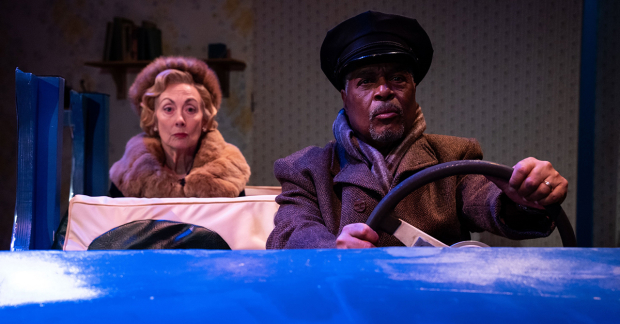Review: Driving Miss Daisy (York Theatre Royal)
Alfred Uhry’s play follows a widowed ex-schoolteacher and her African-American chauffeur

© Sam Taylor
Compared to the award-winning film adapted from it, the play of Driving Miss Daisy is fairly slight, coming in at only 85 minutes of stage time. There is a temptation at first to see it as equally slight in its treatment of problems of race, but from the start Alfred Uhry's text and Suzann McLean's economical and perceptive direction are laying the foundations inconspicuously for a second half of increasing power.
Daisy Werthan, a comfortably-off widowed ex-schoolteacher in Atlanta, Georgia, is a lively, independent-minded 72 year-old. When she crashes her car into her neighbour's garden, her prosperous businessman of a son, Boolie, decides that she needs a chauffeur. His choice is an unemployed African-American, Hoke Colburrn.
This seems set to be a conventional warm-hearted drama of how two opposites gradually find the good in each other – and to an extent it is that, but with a weightier sub-text. Daisy's opposition to Hoke seems to be based mainly on things other than race, mainly her loss of independence, to the extent that at first she refuses to let him drive. The racism is implicit. The scene that ends the first act suggests the ambiguity of the relationship perfectly. On a long journey Hoke wants to pull over for a comfort break; Miss Daisy refuses, asking why he didn't go at the service station; Hoke explains the facilities were for whites only; she still refuses; he takes the break anyway and her vulnerability at being left alone shifts the relationship.
The slow build pays off in the second half. The play consists of short scenes carrying the action from 1948 to 1973 when Boolie takes the ageing Hoke to visit the 97 year-old Miss Daisy in her nursing home. The passage of time is marked by headlines and images flashed up at the back of the simple car-dominated set, with perfectly chosen song snatches to go with them. In the meatier second half this provides some compelling moments as songs of protest give a universal edge to the personal story.
Two major events in Atlanta figure large in the play. Their reactions to the dinner celebrating Martin Luther King's Nobel Peace Prize explore the residual racism in Daisy and Boolie. Most important of all is the bomb attack on a reform synagogue in 1958. Miss Daisy, now the victim of racism, can't understand why her congregation has been targeted, not a conservative synagogue. To these people you're all just Jews, explains Hoke – like we are all just blacks. His tale of lynching the innocent proves his point. The image of a lynching appears, Billie Holiday's "Strange Fruit" plays, and you realise you're watching more than a smart comedy.
But it works well as a smart comedy, too. Paula Wilcox, spry and brisk at the outset, mines the comedy of Daisy's wilful refusal to change and her dismissal of all who don't meet her standards, notably Boolie's social-climbing wife. Cory English does the exasperated male thing very well as Boolie, struggling to make his mother see sense, and Maurey Richards has fun with Hoke's erratic employment record when he is interviewed by Boolie.
All three deepen the performances effectively. Wilcox balances the character's certainties and fears admirably and ages subtly even before the walking frame-bound last scene. Richards clearly marks out the limits of a dignified subservience, but even his assertions of independence are done with tact. The fact that the play is a three-hander moves Boolie to a more central place than in the film – it's about the relationships of all three characters and, as played by English, Boolie is real and sympathetic, whether generously negotiating wages with Hoke or reassuring his mother during a power cut.


















